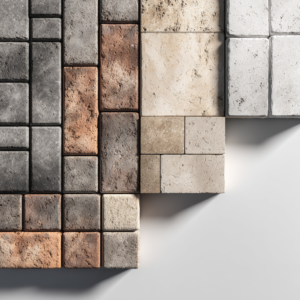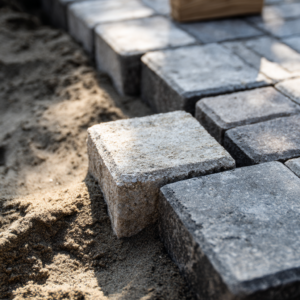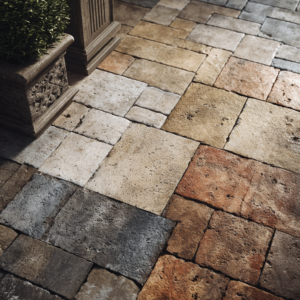Porcelain pavers have gained immense popularity in outdoor design and landscaping due to their durability, aesthetics, and versatility. But one common question that we hear very often is: do porcelain pavers get hot?
That concern arises mainly when considering porcelain pavers for a pool setting. So it is, in fact, extremely important to know whether they become excessively hot in direct sunlight or not.
In this article, we will delve into the properties of porcelain pavers and explore various factors that contribute to their heat retention. By examining the thermal conductivity, color choices, installation methods, and maintenance techniques, we aim to provide a comprehensive answer to this question.
Don’t miss: Pros and Cons of Porcelain Pavers – Complete Guide
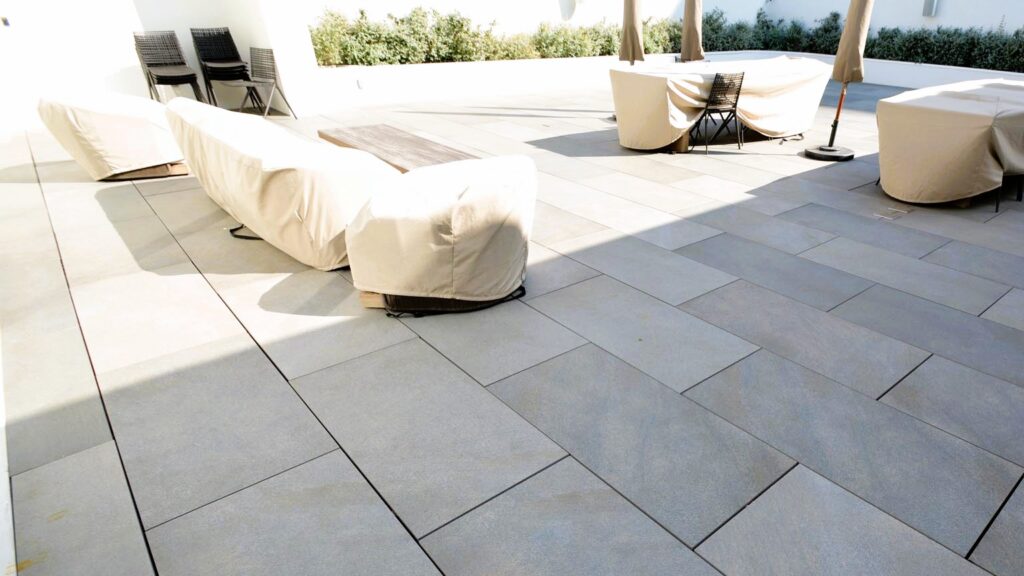
Jump to:
Do porcelain pavers get hot?
They do. That said, understanding how porcelain pavers are made has everything to do with understanding their characteristic heat resistance and durability, and we are going to talk about that ahead. For now, let’s focus on the heat subject.
Porcelain pavers, like any other type of paver or flooring material, can get hot when exposed to direct sunlight or high temperatures. Porcelain, however, is a type of ceramic material that is known for its durability and resistance to heat, so it gets considerably less hot than other materials.
The extent to which they heat up will depend on factors such as the color of the pavers, the intensity and duration of sunlight exposure, and the ambient temperature. Some manufacturers produce porcelain pavers with specific features to minimize heat absorption.
You can take certain measures to mitigate the potential heat from porcelain, or any other paver, for that matter.
Install shade structures or use umbrellas to provide some relief from direct sunlight. Additionally, using light-colored pavers or selecting a product with specific heat-reflective properties can help reduce heat absorption.
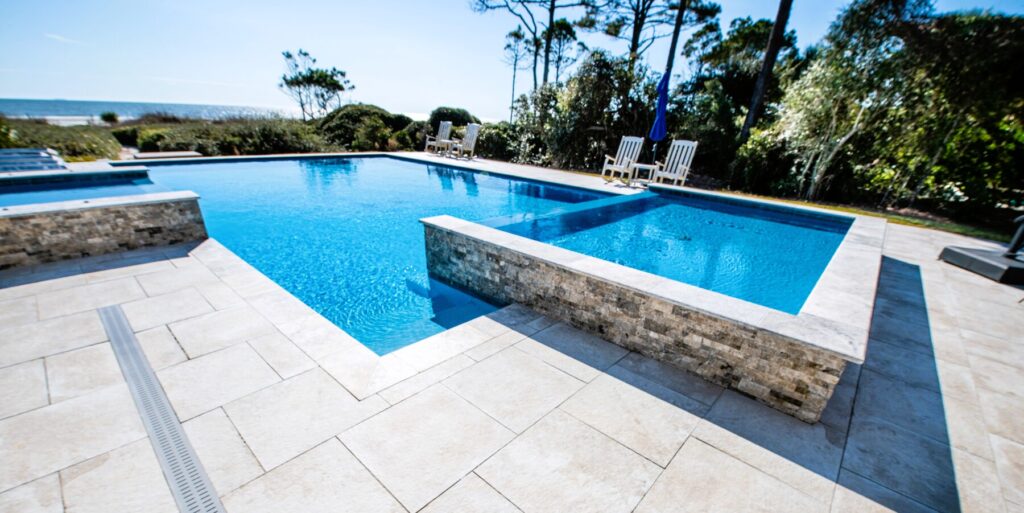
How porcelain pavers are made?
Porcelain pavers are manufactured using a blend of fine minerals, which are compacted and fired at high temperatures. This process creates a dense, non-porous material that exhibits remarkable durability and resistance to weathering.
The primary ingredients used in porcelain pavers are clay, feldspar, and silica. These materials are finely ground and mixed to create a homogeneous blend. Water is added to form a clay-like consistency.
The clay mixture is shaped into individual pavers using a hydraulic press or extrusion machine. The machines apply high pressure to the clay, forming it into the desired shape and size. The pavers can be rectangular, square, or of various custom shapes.
The freshly formed pavers are then dried to remove excess moisture. This is typically done in a controlled environment to ensure even drying and prevent warping or cracking. The drying process may take several hours to several days, depending on the size and thickness of the pavers.
Once dry, the pavers are fired in a kiln at extremely high temperatures, typically ranging from 1200 to 1400 degrees Celsius (2200 to 2550 degrees Fahrenheit). This firing process vitrifies the clay, transforming it into a hard, durable material with low water absorption.
After firing, the porcelain pavers may undergo additional treatments to enhance their appearance and performance. These treatments can include glazing, texturing, or applying special coatings to provide specific characteristics such as slip resistance or color variations.
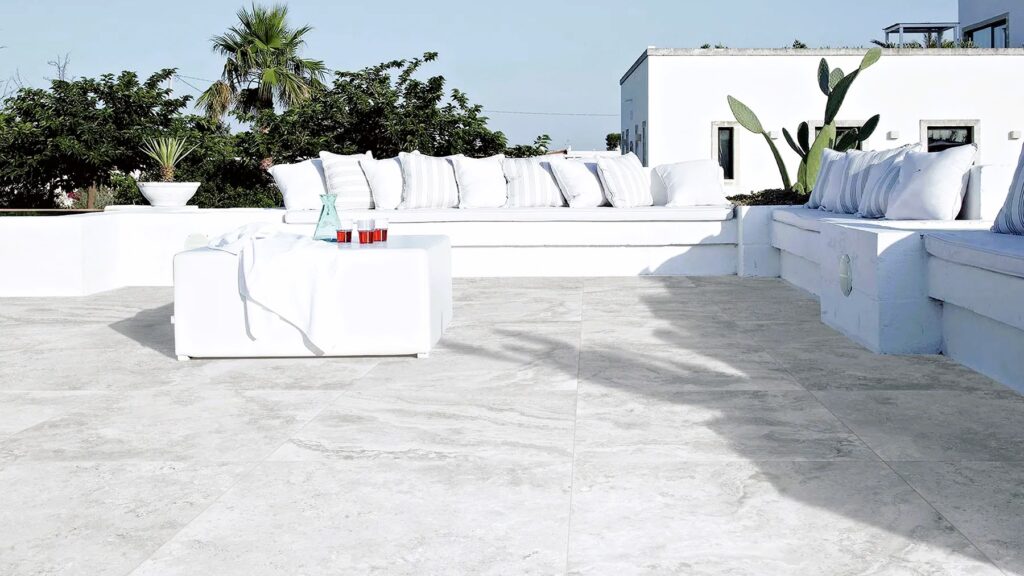
Advantages of porcelain pavers
Porcelain pavers are an excellent choice for outdoor spaces due to their unique characteristics and benefits.
Their density makes them highly resistant to moisture absorption. Unlike some other paving materials, such as natural stone or concrete, porcelain pavers do not readily absorb water. This non-porous nature prevents the pavers from cracking, chipping, or deteriorating when exposed to freezing temperatures or moisture, making them suitable for various climates.
The high firing temperatures during manufacturing contribute to the exceptional strength and durability of porcelain pavers. They can withstand heavy loads, making them suitable for driveways and areas with vehicular traffic.
Porcelain pavers are also resistant to scratching, staining, and fading, making them an ideal choice for outdoor spaces that experience high foot traffic and exposure to various elements.
In addition to their durability, porcelain pavers offer a wide range of design options.
They are available in various sizes, shapes, colors, and patterns, allowing for creative and customized outdoor designs. Whether you prefer a sleek, modern look or a rustic, natural aesthetic, porcelain pavers can complement your desired style.
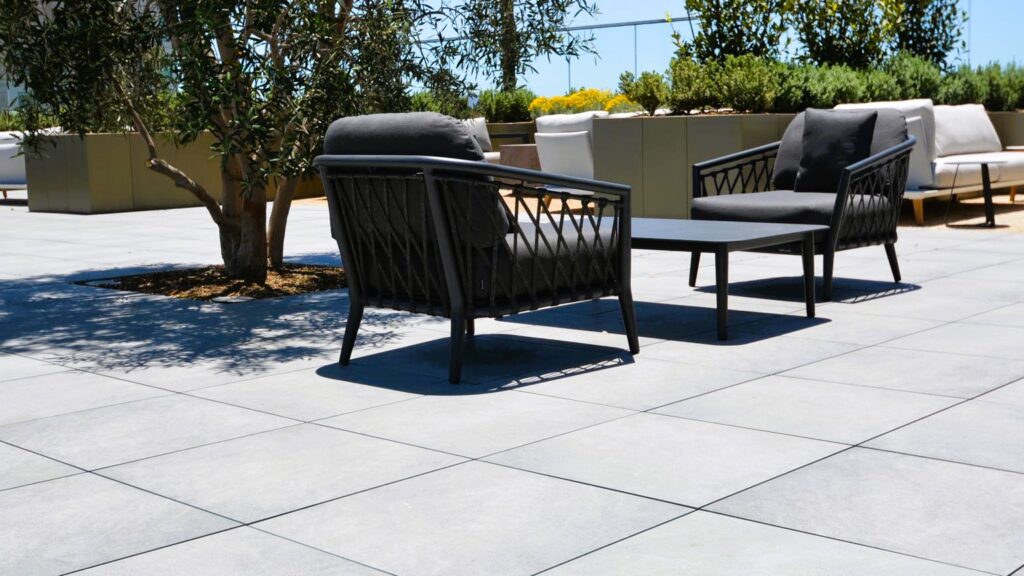
Maintenance and heat reflection
And when it comes to maintenance, porcelain pavers require considerably less maintenance when compared to other paving materials.
This is often an extremely selling point of porcelain pavers. They can be a little bit more expensive upfront, but, thinking in the long run, their cost-benefit is unmatched by other options in the market.
Their non-porous surface resists the growth of mold, mildew, and algae, making them easy to clean with regular sweeping and occasional washing. Additionally, the color of porcelain pavers is fade-resistant, ensuring that they retain their vibrant appearance for years to come.
Regular maintenance of porcelain pavers is essential to ensure their optimal heat reflection and durability.
Over time, dirt, dust, and debris can accumulate on the pavers, decreasing their ability to reflect sunlight and increasing their heat absorption. Periodic cleaning will help maintain the pavers’ reflective properties, reducing heat retention.
Periodic cleaning
A good periodic cleaning of porcelain pavers follows these steps:
- Remove debris
Begin by removing any loose debris, such as leaves, twigs, or dirt, from the surface of the pavers. You can use a broom, a leaf blower, or a soft-bristle brush to sweep the area thoroughly. This step helps prevent the debris from interfering with the cleaning process. - Rinse with water
Use a garden hose or pressure washer on a low setting to rinse the pavers with water. This will help remove loose dirt and debris that may have been missed during the sweeping process. Ensure that the water is evenly distributed across the pavers. - Apply mild detergent
Prepare a solution of mild detergent and water. Avoid using harsh or abrasive cleaners, as they can damage the pavers. Apply the detergent solution to the surface of the pavers, spreading it evenly. - Scrub gently
Use a soft-bristle brush or a mop to scrub the pavers gently. Work in small sections at a time, focusing on areas with stains or stubborn dirt. Be careful not to apply excessive pressure that could cause scratches or damage to the pavers. - Rinse thoroughly
After scrubbing, thoroughly rinse the pavers with clean water. Ensure that all the detergent residue is removed, as any leftover residue may affect the pavers’ heat reflection properties. - Allow to dry
Allow the pavers to air dry completely before using the area again. This will prevent any potential slips or falls that may occur on wet surfaces. Additionally, inspect the pavers for any remaining stains or spots that may require further cleaning.
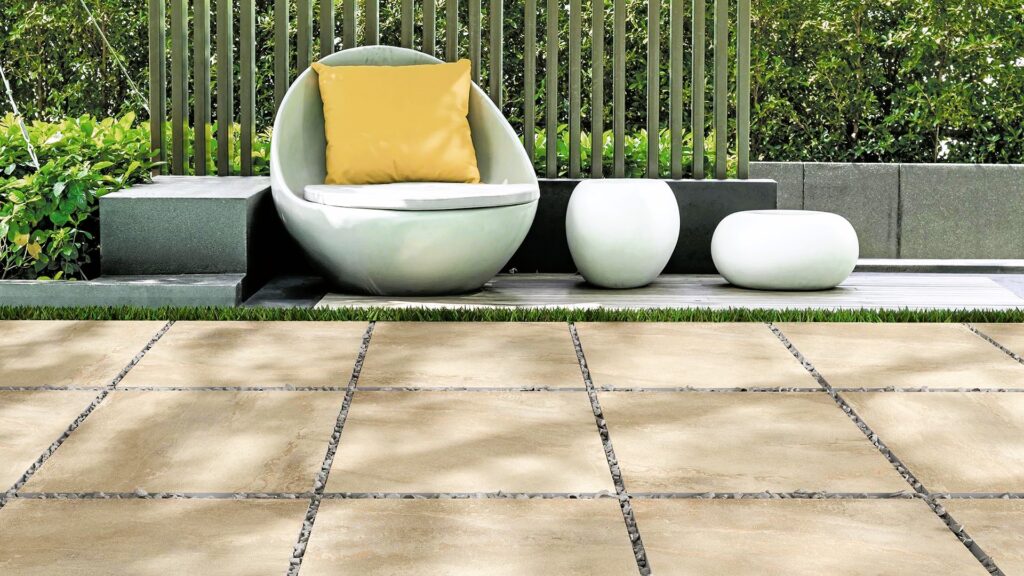
Get your porcelain pavers today!
Porcelain pavers, with their low thermal conductivity and durable composition, exhibit considerably lower heat retention compared to other outdoor paving materials.
While they can become warm under direct sunlight, the choice of color, installation method, surrounding environment, and maintenance practices can significantly influence their heat absorption and surface temperature.
By considering these factors and maintaining a regular cleaning routine, homeowners and designers can make informed decisions about using porcelain pavers in their outdoor spaces while ensuring comfort and enjoyment during hot weather conditions.
We here at JS Brick have been working with porcelain pavers for the last 23 years, so we know firsthand how reliable and powerful they are. If you happen to be around our area of activity, Sarasota County in FL, we gladly offer that service for you and add you to our long list of satisfied customers.
So get in contact with us to get a free estimate and start your project today!

